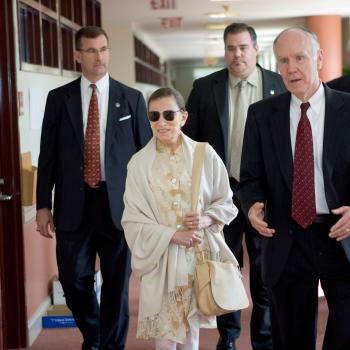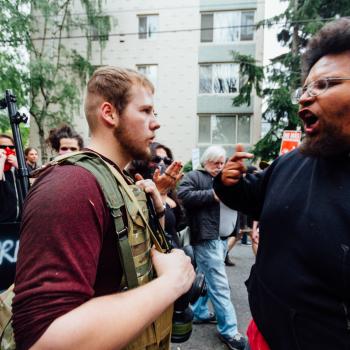“Train up a child in the way he should go: and when he is old, he will not depart from it”
-Pr. 22:6, KJV
It’s hard right now knowing how to be a white columnist. My voice is not the voice that should be centered in the ongoing national dialogue on race, violence, policing and justice, yet very little else feels worth writing. But here I am, with a deadline to meet, and readers who trust me to say something.
One of the things we talk about a lot in progressive seminaries like mine is “social location.” Who am I? Where am I from? What is my lived experience, and how does that inform how I navigate the world? And most important, how can I use all the privilege and oppression and perspective and culture that make up my life to bring a little hope and justice into the world?
I am white. I am a father. I am a white father. And I care about how my kids turn out. I am also an educator, with 20 years of teaching experience from preschool to grad school behind me. I currently work in mental health, and have a degree in psychology. I have a lifelong interest in social justice, and both formal and informal training. I have both taken and taught parenting classes.
I know how to raise good white kids.
So here are a few “rules” for sharing. They’re really more guidelines. Nothing in parenting is ever certain enough to work for everyone. Like anyone else, I’m growing too, so be sure to leave your feedback in the comments.
1) Keep Your Children Close
Hate is born of fear. Fear is born of insecurity. Building a secure attachment with your child from the day they are born (or before) is the best weapon you have against fear and all the sins that are born from it. And this is only one of the many benefits secure attachment brings. The literature on this is immense and wide-ranging, but for those who like to base your parenting in real, valid research and proven practices, here’s an article from the British Journal of General Practice to get you started.
2) Start Early
Just as BIPOC (Black, Indigenous and People Of Color) experience racism from the earliest ages, white children begin confronting race the moment they start noticing the world around them. There is no excuse not to start anti-racist work in the cradle, and continue it throughout a child’s formative years. For those at a loss for resources, there are plenty of good websites out there to help, like the ones I’ve linked to here and here.
3) Give Them Something to Do
Children cannot practice what they do not know. A lot of parents in my experience do teach their children that racism is wrong, but fail to give them any actual tools to fight it. We don’t just teach our kids that fire is bad—we teach them to “stop, drop and roll,” and make them practice, because these are concrete actions that may someday save lives. `
I can’t pretend to know what will work best in your family and culture and parenting style, but I can offer a few things we do in my family that seem to work. Feel free to use these as a springboard, or to discard them completely, and make your own. The point isn’t the specific practice. The point is that you give your child something concrete and specific and useful and good to do. The next several “rules” are geared in that direction:
4) Engage other cultures
I am fortunate enough to live in a college town where I can arrange playdates with children from other cultures any time my kids get bored. My oldest son’s preschool best friend was Jewish, and for years we kept a separate cabinet for dishes and pans that had never touched meat, so we could cook somewhat close to kosher. My youngest son plays regularly with children born in other countries. Both have seen me model learning new languages and trying them out, traveling exuberantly and fearlessly at home and abroad, and including BIPOC friends in our inner social circles. In a way, racism isn’t so far away from a phobia, and one of the best tools for combatting phobia is gentle, consistent, sustained exposure.
5) Accept BIPOC Leadership
Not only do I expect our family to interact with people of other races and cultures, but also I expect that we are going to have to listen, really hear, and sometimes go along with practices that aren’t the same as our own. In someone else’s home, we pray how they pray, eat how they eat, and generally try to observe as many cultural mores as we’re able. In our home too, we do everything within our power to accommodate. Does it matter, ultimately, whether or not my sons know to take their shoes off at their Asian friends’ doors? Probably not much. Does it matter that my sons consistently practice the skill of centering other people’s experiences and following their lead on cultural issues? Absolutely.
6) Manage Conflict Directly
Black children are several times more likely than white children to be severely disciplined in public schools, and innocent black men and women are being killed every day in random encounters with police. Teaching white children to run to authority figures at any sign of conflict not only reinforces their own sense of superiority, but also can directly place someone else’s BIPOC child in the path of the school-to-prison pipeline. Conflict management matters. Conflict management which is sensitive to race and culture and trauma matters even more. This is something children most frequently learn by observing, so you’re going to have to model well, but there are also plenty of resources online–like this one from the Women’s and Children’s Health Network–that can give you some good ideas and formal problem-solving structures.
7) Teach Intersectionality
All oppressions are not the same, but most are bound up together. Teaching anti-racism does not happen in a vacuum. If the underlying skills you want your children to have are empathy, assertiveness, and moral/cultural humility, you cannot also teach those same children to be ableist, or homophobic, or transphobic, or any other kind of hateful that would work directly against those goals.
We are all in this together.
______
If you’ve read this far, I’m grateful. It means we have at least begun a conversation that is very important to me and to many people I love. If you’d like to continue this conversation, one essential tool (I believe) in every white parent’s arsenal should be the book White Fragility: Why It’s So Hard for White People to Talk About Racism by Robin DiAngelo. Here’s a link to the book itself, and another link to a review.













